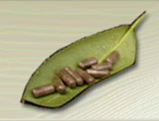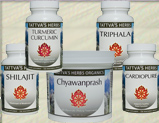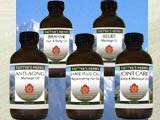Sanskrit name: Bhadramishra
Botanical name: Commiphora Mukul
Habitat: Guggul is spiny shrub or small tree with many branches, usually growing two or three meter high, and found in the arid, rocky tracts of Rajasthan, Gujrat and Karnataka in India. A healthy tree yields 250-500 grams of resin in one season, and Guggul plants typically begin yielding resin after five years. Commiphora Mukul ranges from a woody shrub to a small tree, with spirally ascending branches. Leaves 1-3 foliate, rhomboid to avate in shape, irregularly toothed edges. Flowers are small, from brown to pink in color and are unisexual. It’s fruit is red and oval in shape. The tree grows in rocky and rough terrain in warm and semiarid areas of India. It is found on the slopes of hills and foothills. The oleoresin from Commiphora Mukul has been mentioned in the ancient Indian texts Athavaveda, and in the early medical texts of Charaka, Sushuta, the Samhitas and Nighantus which are over a thousand years old. Textbooks of Ayurvedic Medicine distinguish between fresh and old varieties of Guggul.
Energetics:
- Rasa (taste): Bitter, Pungent, Sweet, astringent
- Virya (action): Heating
- Vipaka (post-digestive effect): pungent
- Doshas( constitution): Balances all the doshas.
Guggul is a well known Ayurvedic herb which normailizes lipid metabolism, and regulates healthy cholesterol and triglyceride levels. In addition, it maintains the body's ability to burn excess fat. It does this safely, effectively, and without the serious side effects that often accompany western drugs
General information:
Guggul or guggulu (commiphora mukul, also commiphora wightii) is derived from the gummy resinous exudate of a plant closely related to myrrh that is found in arid to semi-arid areas of Northern India, Bangladesh and Pakistan. This tree has been used in Ayurvedic medicine for centuries, and Ayurvedic texts dating back to 600 BC recommend it for treatment of atherosclerosis and digestive disorders.
The Sanskrit definition of the term "guggul" is "one that protects against diseases." This attests to the wide respect and therapeutic Ayurvedic applications for this botanical, considered to be the most important herb for the removal of "ama," or toxic substances which accumulate as a result of sluggish digestion and circulation associated with a slowing of metabolism.
Similar to another important Ayurvedic preparation called triphala, guggul is considered tridoshic, or balancing to all three doshas in the body. The three doshas, or bodily constitutions represent the foundation of traditional Ayurveda. These are: kapha or the anabolic humour, watery humour; pitta or the catabolic, fiery humour; and vata, the air or nervous system humour. When all three humours are in balance, the result is health and wellness. When one or more are in excess or deficient this represents imbalance or disease. Guggul stimulates pitta and thus enhances warmth, digestion, circulatory and reproductive processes. It also regulates vata (nerve force) and kapha (fluidic aspects).
As an "ama"-resolving herb, guggul has a wide range of applications beginning with rheumatic and arthritic pains, lowering high cholesterol, “hardening of the arteries” (atherosclerosis), and obesity. Guggul is warming and stimulates metabolism that is why it is one of the few botanicals that has been used to treat hypothyroid conditions. In addition, it is used to treat a sluggish liver, malaria, to stimulate libido, nervous diseases, bronchial congestion, cardiac and circulatory problems, weak digestion, gynecological problems, leucorrhea, sterility, impotence, and various skin diseases including acne and psoriasis. (One of the substances contained in Guggul which is known to lower cholesterol and triglycerides is also noted for its ability to decrease the redness and swelling that occurs in some types of acne) Guggul, as with other resins, is excreted through the skin, mucus membranes and the kidneys. This is what makes it particularly useful for the urinary tract and for a wide number of skin diseases.
Guggul has been used for over 3,000 years and is described in all of the classical Ayurvedic texts including the Sushruta Samhita (3rd to 4th centuries) where it is especially recommended for the treatment of rheumatic pains and obesity, as mentioned above. It is one of the most important rasayanas (herbal tonics) of Ayurveda where it is described as warm, dry, pungent-flavored, and aromatic with nutritive, lubricant, stimulant and digestion-enhancing properties. Current research substantiates its benefit for the treatment of elevated blood lipids and coronary and arterial plaque known as atherosclerosis. As a result, today in India standardized guggul extracts are being approved for lowering elevated serum cholesterol and triglyceride levels.
Contraindications
Purified Guggul may be taken for a long time without ill effect.
Related Guggul Products
Guggul Extract - 120 Capsules

 Loading... Please wait...
Loading... Please wait...














